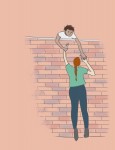Students often find themselves caught up with academics, social lives and doubt about the future – it’s stressful. The GRIT Coaching Program, by the Bruin Resource Center, is trying to fill this need by employing peer counselors to lend an ear to fellow students and helping them improve their mental well-being.
TRANSCRIPT:
LIN: It’s no secret that college can be stressful. The academic pressures, trying to make friends, worries about the future – all of these can add up to a seemingly insurmountable amount of stress. And a lot of the time, it’s hard to find an outlet, someone to talk to.
The GRIT Coaching Program, by the Bruin Resource Center, is trying to fill this need. In it, trained student coaches lend an ear to their peers.
HOOVER: I’m Jenna Hoover; I’m currently a coach with the program at the Bruin Resource Center, and I was also coached through the program last year.
The GRIT Coaching Program creates a space for students to be coached by a peer mentor once a week for an hour, and the difference between coaching and mentoring and advising comes from the mindset that students have the answers within themselves.
LIN: GRIT coaches are trained in tools such as meditation, and time management strategies. They are also trained to help those who have suffered assault and in suicide prevention. Being coached gives students the opportunity to talk out issues they are dealing with. A fourth-year economics student, Hoover has had her share of stress over the years.
HOOVER: One thing that I was experiencing last year was feeling like I should have more friends. I read an article that we should all have 10 to 15 friends. I was like, I don’t have that many friends.
LIN: Her coach was able to help her find a bit of perspective.
HOOVER: She said – why is 10 to 15 the magic number? We worked on – how can I build relationships with people when I’m really busy? We came up with stuff like going to the gym with people, studying with people. These were answers I came up with myself, my coach facilitated the conversation.
LIN: Although each student comes with a unique background and set of concerns, the coaches have noticed some themes. Graduate education student Jaclyn Robbin notices that students tend to be hard on themselves.
ROBBIN: There’s also a lot of comparison going on. All the students I work with, although they’re all really involved on campus, they have a lot of responsibilities, and they’re taking on a full course load, they still look around and see students who they feel are doing more than them. So there’s a lot of feeling like “I don’t compare to so-and-so,” “I need to step up for my future.”
LIN: Robbin feels that the atmosphere at UCLA may place more pressure on students.
ROBBIN: When you have such an exceptional student body, it’s easy to feel that you don’t measure up and feel that you could and should be doing more. I’m sure if you polled 100 students, 90 to 95 of them felt that at one point or another they don’t belong here.
LIN: Second-year neuroscience student Christian Macias is also a GRIT coach who also says many students are dealing with social pressures.
MACIAS: The second thing is the inability to say no to social opportunities that arise. We feel pressure – “I don’t want to say ‘no,’ because what if they never want to hang out with me anymore because I never want to go out?”
LIN: Coaches try to build a relationship with their coachees over time.
MACIAS: My favorite thing to recommend is the idea of journaling and writing out our stresses. The exercise makes us write out our stresses neutrally. A lot of people say, “I’m so stupid, I’m never going to graduate, my GPA is so low …” When you write that down you realize, I say this to myself on a regular basis. The next part of the exercise is to change the self talk to a more positive direction.
It seems impossible to dig out of that rut – you catastrophize the situation, and it just seems infinite and very bleak. But once you realize it’s just small steps you have to take, it seems more practical.
LIN: Robbin tries to help her coachees by providing a listening ear and trying to point out cognitive distortions.
ROBBIN: We talk about ways your brain runs away with itself and developing strategies to address that.
LIN: The coaches try to provide an open space for students and provide them with resources, guiding them toward more positive thinking and behavior.
HOOVER: The one thing that sticks with me is that it created a space for me to reflect on my life and how it was going and what I wasn’t satisfied with. Before, I didn’t have the space to be talking through things with people.
What stands out most to with me was being with someone who was generally interested in my well-being and spending an hour with someone who was caring about me. And that’s a really great thing to have. Unfortunately, I think it’s not something everyone has.
LIN: But the GRIT coaches are trying their hardest to make sure it’s something everyone does have.
For Daily Bruin Radio, this is Denise Lin.
